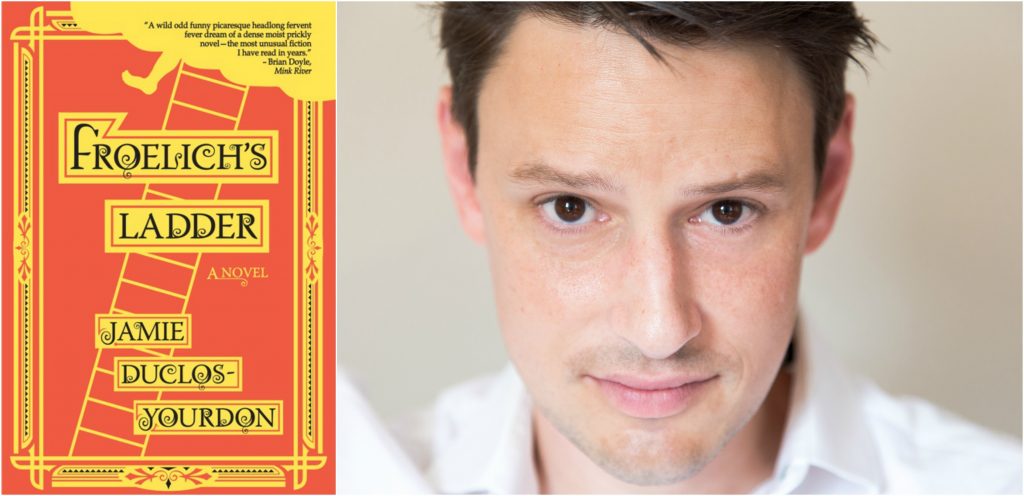Jamie Duclos-Yourdon’s debut novel, Froelich’s Ladder, is part Twain-ian tall tale, part history lesson, part fantasy, and part social commentary on generosity and social interdependence in a magical, but realistic, Oregon forest of 145 years ago. Froelich’s Ladder is thoroughly Made in Oregon, a product of Portland’s Forest Avenue Press with help from The Guttery, the Portland-based writing group that counts Jamie, myself, and a number of other notable writers among its membership. Jamie’s delightful made-up world is rooted in the tale of two German immigrant brothers, one named Froelich, who disappears to the top of a very tall ladder.
*
Let’s face it: The tall tale has fallen out of fashion of late, and yet here we are: you have revived it. What made you want to tell a story in this style? Mark Twain immediately comes to mind as an influence, but I wonder if you might have been inspired by someone or something else, too.
Having written previous work that was fantastical but not grounded in reality, I was aware of the necessity of plausible touchstones. Hopefully, the state of Oregon and the year 1871 will orient readers in space and time, which will then allow me to disorient them with an incredibly tall ladder.
To me, a lot of Froelich’s Ladder is the logical follow-through of an illogical premise. You have someone at the top of a ladder and you have to get him off (“you” being the writer). Clouds quickly occur as a possibility, and if a character is traveling on a cloud then he’s to go one direction or the other. The more you concern yourself with details (are the rungs uniform? how would a one-handed Sergeant Major tie his shoelaces?), the less fabulist it all begins to feel. Until you take a step back and ask, “What is this thing?”
This is 1870s Oregon but also a magical fantasyland. How much research, if any, did you do on early Oregon? Did historical accuracy mean much to you?
Yes! It meant a lot to me and my copy editor. I did a fair amount of research before, during, and after. You don’t want a reader to get sidetracked by the question of whether bowling alleys existed at a certain point in time. It’s when you find yourself going down the rabbit hole of Internet research regarding the imprecise date of Johnny Appleseed’s death that you’ve sacrificed a productive day of writing.
The one choice you made that struck me the most in Froelich’s Ladder is how you have redacted the swear words (unless they’re in German). Why did you make this choice?
Partially for aesthetic reasons: Eleanor Catton uses this technique in The Luminaries and I thought it looked beautiful on the page. Also, partially for continuity. I’m from New York; I curse liberally and often. But Froelich’s Ladder is, on the whole, a very sweet book, and I wrote it with the intention of projecting a kind of generosity upon the world. Redacting the vowels in the swear words was a final gesture toward elevating the discourse.
There were things in the book that I found to be quite dark if my mind got stuck on them for a while. Stories such as Binx holding up the ladder for years, for example, strikes me as tall tale fodder, but removed from the cloak of fictional extremism, it reads as a metaphor for a life lost. No real question here other than could you speak to the dark sections of what is an otherwise light read?
I was working on a first draft when we were pregnant with our first child. At the time, I was a wreck, thinking of this tiny, defenseless person being introduced to the world (and my subsequent responsibility to defend him). So I started to craft a reality in which everything’s okay and love ultimately triumphs. From a plot perspective, each of my characters has the opportunity to help another character, and they all take that opportunity. Now, in order to facilitate those decisions, I had to introduce them to peril. I was fine sticking them in dire situations, knowing that they’d make it through unscathed. Nobody comes off worse than he or she begins.
What was the hardest part of writing this book?
There was a tremendous amount of revision involved. With the help of my publisher and my writing group (perhaps you’ve heard of them, Mo? The Guttery?), I transitioned from the first person voice to third person and from present tense to past tense. A least one subplot was excised. But all the characters kept their original names, a minor victory! And I was able to see the story through fresh eyes. Any book can be written and rewritten in countless different ways. It was tremendously valuable to discover that.
Tell me about working with Laura [Stanfill] and Forest Avenue Press.
It’s been the most collaborative experience I’ve ever had as a writer. Coming out of an MFA program, I’ve never shared ideas, successes, and failures with anybody so happily. I can’t wait to work with Laura again.
What are you working on next?
A book-length Mesopotamian ghost story! It’s fabulist in nature (i.e. talking crows, people returning from the dead), but it’ll address real-world themes of guilt and grieving. Hopefully the same audience that enjoys Froelich’s Ladder will find it appealing.
*
Froelich’s Ladder will be published by Forest Avenue Press on August 9, 2016. Find out more at jamieduclosyourdon.com.




